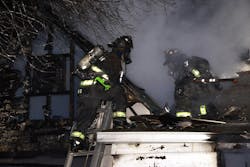Support Network Wants FFs to Have Facts on Cancer Risks
Source Firehouse.com News
June 8-- The risk firefighters face for developing job-related cancers was well known in the fire service long before elected officials and the national news media started taking more notice in recent years and cast a brighter light on the issue.
There are 37 states that have passed cancer presumption laws for firefighters, which provide workers' compensation benefits for those with certain types of cancers directly attributed to the job. With the fight ongoing in the remaining states, the issue was recently front and center when firefighter Michael Palumbo Jr., who championed such a law in Ohio and had the resulting bill named after him, lost his battle with cancer on May 24.
The long-term health effects firefighters exposed themselves to in the aftermath of the Sept. 11, 2001, terror attacks have begun to manifest for many in recent years as well, which has helped push the issue even more into the public eye. That was evident by the outpouring of emotion last week upon the death of former New York City firefighter Ray Pfeifer, whom officials say contracted cancer during eight months of digging through toxic debris at Ground Zero. Comedian John Stewart wept as he gave Pfeifer's eulogy last Friday.
With this widened exposure to an issue so crucial to many firefighters and their families, the nonprofit Firefighter Cancer Support Network (FCSN) has put together a Fact Check to help make sure that elected officials, the media and – most importantly – our nation's firefighters have the correct information and statistics on the risks they face so they can make sound health decisions.
"The issue of inaccurate data has been across the board and really did come to a head at a recent conference where there were giant signs on the exhibit floor saying 68 percent of firefighters are going to get cancer," Tim Elliott, the vice president of communications for the FCSN, said Wednesday in an interview with Firehouse.com. "It's simply not the case, so that prompted us to try and make sure we were giving people some of this important data."
Easily the most talked about statistic in the media and among firefighters is the one Elliott highlighted: What is the overall cancer risk?
According to a multiyear study released in 2015 by The National Institute for Occupational Safety and Health (NIOSH), firefighters have a 9 percent higher risk of being diagnosed with cancer and a 14 percent higher risk of dying from cancer than the general population. The report also dives into the even greater risks firefighters face for developing certain types of cancers.
Another key takeaway from the fact check is that 61 percent of line of duty deaths for career firefighters between 2002 and 2016 were attributed to cancer.
While these figures are nothing to scoff at, the FCSN says it has seen and heard many inaccurate references to statistics alleging that firefighters are anywhere from the 68 percent Elliott mentioned seeing to a whopping 250 percent more likely to be diagnosed with cancer.
The risks may be very real and cause for constant precautionary measures, but having the wrong data won't help in either the firehouse or the state house.
"We're the ones that people typically come to when they're looking for data about cancer in the fire service," Elliot said. "And for the past 16 months or so, the numbers have started getting skewed and they've been wildly inaccurate. And instead of people checking them or verifying them or tracking down the source, they've just been repeating them."
Firefighters also need to be aware that the most simple preventative steps they can take are within their control, including keeping themselves and their gear clean after response calls, maintaining a healthy and balanced diet, and getting a suitable amount of exercise.
Elliott says even a simple Google search will result in dozens or more instances of bad data, which were actually referenced in the fact check's introduction to illustrate how easily incorrect statistics can be obtained. Checking with the websites for organizations such as NIOSH and the International Association of Fire Fighters (IAFF) can also lead those seeking information in the right direction.
"Awareness of the risks to firefighters has increased significantly, so now we're really focusing on prevention. We want to interrupt that curve and bring the numbers down, and the way to do that is to prevent firefighters from being exposed to carcinogens as much as we can."
For more information on cancer prevention measures firefighters can take or the options they have after a diagnosis, visit the FCSN's website.






